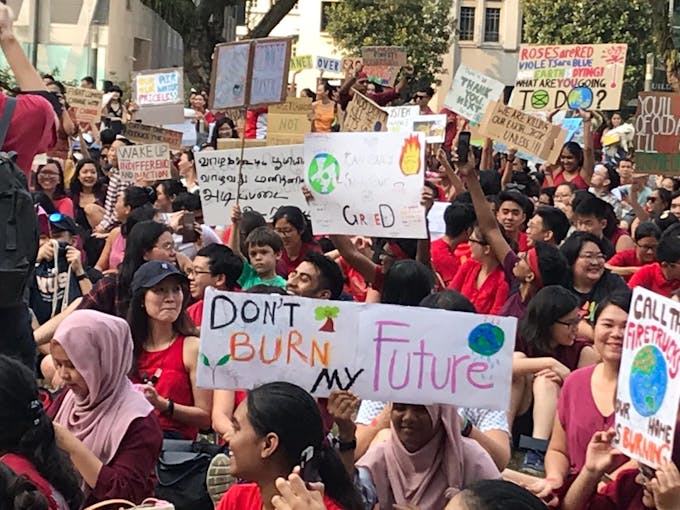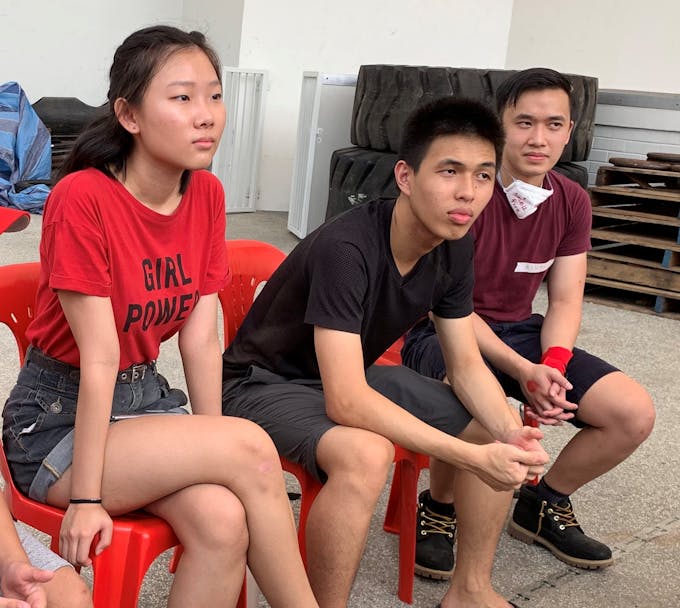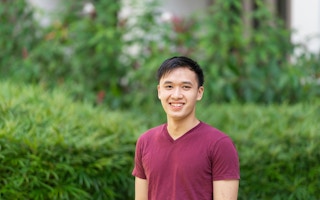Concluding his fourth year at Yale-NUS College (YNC) as an environmental studies major, Aidan Mock has been actively involved in climate activism, both in his personal and professional life.
To continue reading, subscribe to Eco‑Business.
There's something for everyone. We offer a range of subscription plans.
- Access our stories and receive our Insights Weekly newsletter with the free EB Member plan.
- Unlock unlimited access to our content and archive with EB Circle.
- Publish your content with EB Premium.
His most notable achievement to date is co-organising Singapore’s first climate rally in 2019. About 2,000 people came together in support of bolder targets to reduce the country’s carbon emissions, and declare a state of national climate emergency.
The climate rally gave the organisers the opportunity to explore what it means to take part in political activity as a youth in a country not known for freedom of speech, and its success gave him hope for Singapore’s future.
“It allowed us a way to drive institutional change rather than just focusing on lifestyle change. The climate rally is one of the ways in which we’re calling for big system change in Singapore,” he said.
The organisers are seeing impacts at the government level. In the long-term emissions development strategy announced earlier this year, the government admitted that it would not reach net zero emissions before 2050.

Mock co-organised Singapore’s first climate rally to demand more ambitious climate targets. Image: Eco-Business
“We’ve been pushing the government very hard to commit to net zero by 2050. The fact that they’re using the same kind of language that we’ve been using is a good step. It’s always a work-in-progress, a dialogue,” Mock explained.
His latest stint with Mighty Earth involved a campaign to end deforestation linked to palm oil production. The US based non-profit organisation works to transform the palm oil industry to engage production that conserves forests and respects indigenous community rights.
In this interview with Eco-Business, Mock shares the pros and cons of his university’s environmental programme, why palm oil is an immediate concern, and his dream job of pushing companies to adopt better environmental policies.
What are you studying?
I am studying environmental studies at YNC, with a specialisation in marine ecology in the face of anthropogenic changes, like climate change and land use change. My capstone focuses on that; I used satellite data to map where we see coastal hardening in Southeast Asia—more specifically in Singapore, Peninsula Malaysia and Brunei. I was looking for things like sea walls, breakwaters and concrete revetment. Coastal hardening has major implications for habitat and ecological processes in those areas.
What prompted you to study environmental studies?
I’ve had a lot of exposure to natural spaces since a young age. My parents brought me to places like Pulau Ubin and Sungei Buloh (a small island off Singapore and a nature reserve respectively), and the opportunity to study about these living spaces really excited me. I also enjoyed learning about the interactions between organisms and ecology in general.
“
The most important thing to me is whether companies address their identified problems in a meaningful way. Is it just greenwashing, or are they serious about transforming the industry?
I also just love coral reefs. They’re so ancient—they’re one of the first ecosystems to emerge when life first began on the planet. During a dive, you can see the whole ecosystem from wherever you are, the primary and secondary producers, the coral reefs. You can really see everything at one glance because it’s so contained, it’s amazing.
Do you feel that your university course has prepared you well for a career in sustainability?
Yes and no. I think the YNC programme was very successful in getting students to think critically about what sustainability means—like what greenwashing is, what constitutes good environmental policy, and what are the potential challenges and pitfalls in implementing good sustainability policy.
The broadness of the programme also allowed me to explore what the areas of sustainability that I was specifically interested in. And it made me think about what really matters in dealing with climate change.

Aidan Mock (far right) takes questions from the media during SG Climate Rally. Image: Eco-Business
One of the weaknesses of the programme is in the technical side of things. For example, reading a financial statement, or learning to understand companies’ sustainability policies. The programme was lacking in things that were more corporate in nature. I only got more experience and exposure to such things through internships and doing my own research.
During my internship with Mighty Earth I was involved in pulling supply chain data. I learnt to look critically at the supply chain of commodity companies, and to read into the various issues that are at play when companies release environmental. These are things that we weren’t taught in college.
Did your interest in palm oil supply chains and sustainability policies stem from a course in school?
I think it was an interest that I developed outside of college. I’ve spent quite a lot of time in Indonesia, diving and traveling, it’s a country that’s very close to my heart. I also spent two years studying Bahasa Indonesia, so I was naturally drawn to the topic.
Palm oil is also a topic that always comes home either through the haze situation, or through rogue palm oil companies that have their operations in Singapore or are based here. These reasons make palm oil a more immediate concern.
What are the things you look for in a company when applying for sustainability jobs?
The most important thing to me is whether companies address their identified problems in a meaningful way. Is it just greenwashing or trying to get a green license, or are they serious about transforming the industry?
The type of approach that they use is important to me too. So the organisation that I work with is not afraid to call people out for underperforming. My peers and I are a bit sceptical about sustainability initiatives that are hesitant to call businesses out.
Another important thing is the composition of the team. Especially if the organisations are working in Southeast Asia, I would like to work in teams with a greater percentage of locals.
What sort of training would you want on your first job?
I’m trying to get into either supply chain analysis or sustainable finance. On the supply chain front, I would like to understand industries better, who the big players are and what key issues are preventing better policies from being undertaken.
“
There needs to be a greater focus on companies in Singapore. We’re such a big part of the monetary flows that happen in the region.
On the finance front, I want to understand financial mechanisms better—like how to read green bonds, green loans, and micro-finance. I would like to better understand the different aspects of sustainable finance and how they can be used in relation to empowering local communities, and also pushing companies to reduce their climate impact.
Which companies do you admire for their approach to sustainability and why?
Any company that is willing to support civil society action, and recognises that it’s an important part of the landscape.
Patagonia is a good example. They have some excellent approaches to sustainability and managing their supply chains. They also try to reduce material resource consumption in the long run. Ben and Jerry’s also funds climate activism in Australia and other parts of the world.
Funding climate activism is a really good trend for companies to set. They need to ask themselves how to support the ground up work that we need to deal with the climate crisis.
But my heart lies with non-governmental organisations like Mighty Earth and Conservation International, which are both very involved in the region.
Who are your sustainability role models?
Greta Thunberg is an obvious one, but I’ll focus on some activists in Singapore and the region. Tammy Gan and theweirdandwild do excellent criticisms and analysis on their Instagram accounts of structural inequalities and other environmental problems in Singapore. Coco Oan does excellent work in the bring-your-own communities, she’s a big advocate for eating plant-based diets and models responsible sustainable behaviour and pioneers the way for other folks.
Nor Lastrina Hamid does a lot of work across different communities in Singapore. She’s a founder of Singapore Climate Youth for Action, and a huge champion of all the environmental movements in Singapore.
Anna Oposa runs Save Philippines Seas and I attended one of her training programmes to learn more about activism and environment. She’s a really strong and inspiring person to follow because she runs some amazing campaigns in the Philippines on sharks and other rare marine species.
What’s your dream job?
My dream job is to get paid to do corporate climate activism. In my mind, it would be to go after companies in the finance sector and run campaigns to pressure them to adopt better environmental practices. For example, can we get Temasek to divest from all the fossil fuel holdings that it has, or can we change the energy sourcing or material sourcing policy of companies in Singapore.
I get to do a bit of this with Mighty Earth, but I think that there needs to be a greater focus on companies in Singapore. We’re such a big part of the monetary flows that happen in the region, and a lot of the supply chain also flows through our ports or comes through our borders administratively. I think real scrutiny on these flows is really important.














